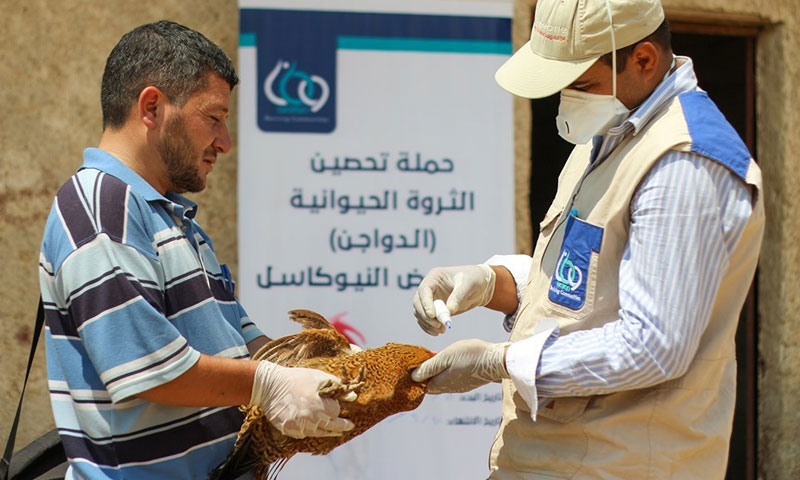Idilb’s poultry farms bore witness to the first chicken vaccination campaign, aiming at protecting village chickens from the Newcastle disease, which has been causing the death of fowls in massive numbers, leaving, thus, a negative impact on Syria’s livestock.
With the support of the Food and Agriculture Organization of the United Nations (FAO), Watan Foundation launched the first phase of a vaccination campaign against the Newcastle disease on 11 July, in the majority of poultries in Idlib and Aleppo governorates.
Livelihood support for vulnerable families
The main goal of the project is to support vulnerable families in Northern Syria, which rely on livestock as their primary source of income, according to Ziad Sibai, media director of Watan.
Sibai added, telling Enab Baladi, the project takes the protection of livestock into account through launching vaccination campaigns, supporting the veterinary treatments and improving the incomes of vulnerable families who lost livestock during the ongoing armed conflict.
The vaccination campaign against Newcastle disease had been carried out in most of the poultry farms in Idlib province, as well as houses with one chicken, to ensure full protection of the area from the disease, according to Sibai.
Sibai also said that the medical team of Watan Foundation had recorded the vaccination of about 1.2 million keeping chickens and domestic birds, by reaching about 40 thousand of poultry farmers.
Ahmed Qarmo, a chicken farmer in Tal Ammar town, northwest of Idilb, believes
that these vaccination campaigns are very necessary at a time, where livestock is suffering ongoing deterioration.
Qarmo said to Enab Baladi that the project saves the poultry farmers a lot of expenses for vaccinating fowls and village chickens, protecting them from death as livestock is the main source of livelihood for many families in Northern Syria.
Similar campaigns are to be implemented by Watan Foundation with the support of FAO for protecting livestock in opposition-controlled areas. Watan Foundation announced launching five sheep and goat vaccination campaigns, feeding projects in addition to building mobile health clinics, for helping the vulnerable families depending on raising cattle.
What is Newcastle Disease?
The veterinarian Rifaat Abd Rabu told Enab Baladi that “the Newcastle disease” is considered one of the most dangerous viral diseases affecting chickens of all ages, being highly contagious. It is characterized by digestive, neurological and respiratory symptoms.
Newcastle disease spreads rapidly among birds and chickens by inhaling the air in the affected area, eating feed contaminated with the virus, or by direct contact with diseased or carrier birds.
According to the vet. Abd Rabu, who lives in Harim district, Idilb, chicken of all ages and species are the most susceptible to infection. Pigeons, turkeys, wild birds can also catch the Newcastle disease while waterfowls resist the disease, but only waterfowls of small ages get infected.
Abd Rabu added that human infection with Newcastle disease is uncommon and if transmission occurs, it is not considered dangerous. Conjunctivitis (pink eye) is one of its symptoms: severe eye pain in the conjunctiva occurs after three days of getting infected without causing serious complications.
As for vaccination of chicken against Newcastle disease, the veterinarian Rifaat Abd Rabu explained that the vaccination goes through multi-stages. The first stage is where the vaccine is given as an eye drop and after three to four months chickens are given a double dose through drinking water or spraying the vaccine directly on the fodder. The second dose should be given after three weeks. Revaccination is carried out every three months for enhancing the immunity of vaccinated fowls and the other fowls living with them.
According to figures by the UN Food and Agriculture Organization (FAO), the mortality rate among chickens caused by Newcastle disease may reach 80% at the peak of the spread of the epidemic, making Newcastle disease one of the most serious diseases affecting chickens.

